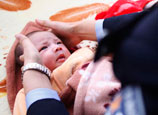
Previous auctions
In 2010, at the 150th anniversary of Yuanmingyuan's pillage, the park issued a proposal calling for individuals and institutions that have looted relics to give them back and boycotting any auctions or transactions of the relics.
Last November, English auction house Bonhams issued a statement saying that the owners decided to call off the auction of two cultural relics that belonged to Yuanmingyuan, to avoid arousing Chinese people's indignation. It was the first cancellation since the proposal was published.
But before that, over 20 cultural relics from the park had been successfully auctioned since 2010 both at home and abroad, said Liu, who has spent years studying lost cultural relics.
The pillaging of 1860 resulted in a large number of cultural relics from the garden being scattered abroad. There is no exact number, but staff at the park estimate that at least 15 million cultural relics were taken abroad illegally. These cultural relics are appearing frequently at auctions in recent years as the owners see a huge market in China. Long after the original theft, items such as porcelains, sculptures, furniture and silk paintings were all sold legally.
Notable auctions involve the bronze heads of the Chinese zodiac animals. The 12 symbolic creatures were sculpted in the reign of emperor Qianlong during the Qing Dynasty (1644-1911). In 2000, Sotheby's in Hong Kong and Christie's in Hong Kong auctioned three of the bronze heads. In 2009, Christie's in Paris auctioned another.
At the Sotheby's and Christie's auctions, Chinese company China Poly Group Corporation bought the three bronze animal heads, spending HKD 35.4 million ($4.57 million), three times their pre-sale estimates.
Besides bronze heads, many important imperial seals have also been auctioned at high prices in the past decade. In 2009, a seal with characters Jiuzhou Qingyan (name of the largest island in Yuanmingyuan), was auctioned at 1.38 million euros in France, several times the pre-sale estimate.
It is widely known that the price of cultural relics will rise many times once the market connects them to Yuanmingyuan. To many, it is hateful that auction houses raise the prices and make money from China by auctioning Chinese cultural relics. But to Liu, auction houses merely reflect market behavior, and as long as there is no cheating, they remain blameless.
"Merchants are driven by profit. It is not realistic to call for donating the cultural relics," he told the Global Times, "the only reliable way to get them back is through purchase."















 Ministry urges school safety after fatal van crash
Ministry urges school safety after fatal van crash


![]()
